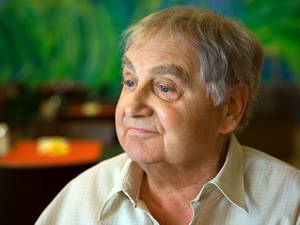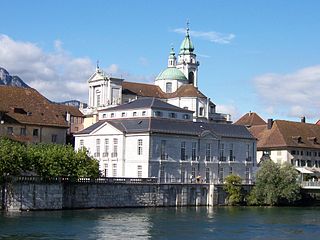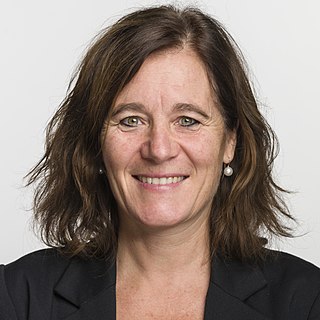Related Research Articles
The Solothurner Literaturpreis is a literary award for a literary achievement by a German language writer.

Andrea Štaka is a Swiss film director and screenwriter, best known for winning the Golden Leopard at the 59th Locarno International Film Festival in 2006 for her film, Das Fräulein.
The Swiss Film Awards are national film awards awarded in several categories of Switzerland, first given out in 1998.

The Solothurn Film Festival (SFT) is the most important festival for Swiss film productions. Founded in 1966 in the Swiss city of Solothurn, the annual festival presents a representative selection of Swiss feature, documentary, and short film productions. In a series of public talks and panel discussions, the audience meets with members of the film industry to discuss the screened films and the culture of film in Switzerland. With over 60,000 visitors every year, the Solothurn Film Festival ranks among the most renowned cultural events in the country.

The Tonhalle is a concert hall in Zurich, home to the Tonhalle-Orchester Zürich, one of Switzerland's leading orchestras. The 1455-seat hall, located at Claridenstrasse 7 in Zurich, was inaugurated in 1895 by Johannes Brahms. The hall is considered to be "acoustically superb". Since 1939, it is part of the building complex Kongresshaus Zürich.

Kathrin Röggla is an Austrian writer, essayist and playwright. She was born in Salzburg and lives in Berlin since 1992 but moved to Cologne in 2020. She has written numerous prose works, including essays, as well as dramas and radio plays. For her literary works, she has won a wide range of awards.

Akte Grüninger is a Swiss-Austrian feature film produced in 2013 for the Swiss television SRF. The television film focuses on events in late summer 1938, when Paul Grüninger saved the lives of up to 3,600 Jewish refugees from Germany and Austria by pre-dating their visas, enabling them to migrate 'illegally' to Switzerland.
Züri brännt is a 1981 Swiss documentary film directed by the Swiss filmmakers Markus Sieber, Ronnie Wahli, Marcel Müller, Thomas Krempke. Beginning on 22 January 2015, the film was shown during the Solothurn Film Festival as one of the milestones of Swiss film history.

Usfahrt Oerlike is a 2015 Swiss German-language film. It was filmed and produced at locations in Zürich in Switzerland, and is the second last film starring Mathias Gnädinger, and Jörg Schneider's last movie film.

Jörg Schneider was a Swiss stage and film actor starring usually in Swiss German-language cinema and television and stage productions. He gained great renownedness in the German-speaking area by numerous Kasperle, Pumuckl and fairytale-radio plays records and also adapted plays for the Swiss German language.

Der grosse Sommer is a Swiss-German language comedy film that was released in Switzerland on 28 January 2016. Produced partly in Japan, it is the last film to star Mathias Gnädinger.

Als die Sonne vom Himmel fiel is a 2015 Swiss documentary. Focusing on the atomic bombing of Hiroshima by the United States Army Air Force on 6 August 1945, it was filmed and produced at locations in the Hiroshima and in the Fukushima prefectures, Japan, and produced by the Japanese-Swiss film-maker Aya Domenig.
Aya Domenig is a film-maker and anthropologist of Japanese–Swiss origin.

Gen Atem is a visual and performance artist, musician, writer, and Zen-master. He lives and works in Zurich, Switzerland.

Ruth Grossenbacher-Schmid is a Swiss politician of the Christian Democratic People's Party (CVP). She was a member of the National Council for the canton of Solothurn from 1991 to 1999.

The Kantonales Kulturzentrum Palais Besenval was a state cultural center in the Swiss town of Solothurn that existed from 1990 to 2000. It was located in the Palais Besenval at Kronengasse 1 and served mainly as a Kunsthalle.

Enter is a museum for computer and consumer electronics in the Swiss town of Solothurn. Now a non-profit foundation, it originated as the project of Swiss entrepreneur Felix Kunz. It is the largest private technology collection open to the public in Switzerland. Its current location in Solothurn opened in 2011.

Andreas Reize is a Swiss organist and conductor, with a focus on opera and choral conducting. He was appointed Thomaskantor on 11 September 2021, becoming the 18th director of music to take charge of the world famous Thomanerchor at Leipzig in succession to Johann Sebastian Bach.

Franziska Roth is a pedagogue and politician of the Social Democrat Party of Switzerland (SP). Since 2019, she is a current member of the National Council, the lower house of the Swiss Parliament.

Christian Josia Maria Dieter Imark commonly known as Christian Imark is a Swiss businessman and politician. He currently serves on the National Council (Switzerland) for the Swiss People's Party since 2015. In 2001, Imark was elected as the youngest member into the Cantonal Council of Solothurn, aged 19. He served until 2015 when he was elected into National Council. He also served as the youngest president of the Cantonal Council in its history in 2012.
References
- ↑ Le Devoir (2016-12-20). "Passation des pouvoirs au FIFA". Le Devoir (in French). Retrieved 2022-12-10.
- ↑ "Editorial, 36è FIFA 2018". Le FIFA / Narrative Boutique (in French). Narrative Boutique. 2018-03-08. Retrieved 2022-10-10.
- ↑ Anita Hugi wird neue Direktorin der Solothurner Filmtage. In: Neue Zürcher Zeitung. 27. Juni 2019.
- ↑ Denise Bucher (2021-08-14). "Schon wieder eine Direktorin weniger". Neue Zürcher Zeitung (NZZ) (in German). NZZ Verlag. Retrieved 2022-08-01.
- ↑ Daniel Fuchs (2021-01-27). "Die Solothurner Filmtage mussten komplett online gehen". St. Galler Tagblatt (in German). CH Media. Retrieved January 6, 2021.
- ↑ Lea Durrer (2021-01-27). "Fast 30'000 gebuchte Online-Filmvorstellungen". Solothurner Zeitung (in German). CH Media. Retrieved January 2, 2021.
- ↑ Fränzi Zwahlen: Nach Abgang der Direktorin: Filmtage-Präsident Geiser erklärt die Neuorganisation. In: Solothurner Zeitung. 12. August 2021.
- ↑ "Solothurner Filmtage: Stellungnahme zur angekündigten Trennung von Anita Hugi". Website des Regieverbands Schweiz ARF-FDS (in German and French). Regieverband Schweiz ARF-FDS. 2021-08-19. Retrieved January 9, 2021.
- ↑ "Anita Hugi leitet künftig das Filmdepartement an Genfer Hochschule" (in German). 2023-08-02. Retrieved 2023-11-28.
- ↑ Anita Hugi: Unerzählte Biographien: Cherchez la femme! SRF, 4. November 2013.
- ↑ Archived (Date missing) at solothurnerfilmtage.ch (Error: unknown archive URL). Website der Solothurner Filmtage, Januar 2021.
- ↑ "Ne ratez pas: «Marceline, une femme, un siècle»". L’Obs (in French). 2020-10-22. Retrieved 2020-06-10.
- ↑ Marceline – Eine Frau, ein Jahrhundert. SRF, Highlights aus dem Programm von Sternstunde Kunst, 12. Juni 2020.
- ↑ "Passation des pouvoirs au FIFA". Le Devoir (in French). 2016-12-20. Retrieved 2020-03-08.
- ↑ "Festival International du Film sur l'Art FIFA 36e – Montréal". Narrative Boutique (in French). 2018-02-25. Retrieved 2020-01-29.
- ↑ Antoine Duplan (2020-01-21). ""Anita Hugi fait la lumière sur Soleure"". Le Temps (in French). Retrieved 2020-03-08.
Interview zu den 55. Solothurner Filmtagen
- ↑ Kathrin Halter (2020-01-06). ""Die Unkompliziertheit, die Lust an der Arbeit erinnern mich an Montréal"". Cinébulletin . Retrieved 2020-03-08.
Interview mit Anita Hugi zu den 55. Solothurner Filmtagen
- ↑ Eklat um Führung des Festivals. In: persoenlich.com. 12. August 2021.
- ↑ Denise Bucher (2021-08-14). "Wieder eine Direktorin weniger". Neue Zürcher Zeitung (NZZ) (in German). NZZ Verlag. Retrieved October 10, 2021.
- ↑ Anne-Sophie Scholl (2021-11-10). "Die Buddys von Solothurn". Die Zeit (in German). Retrieved 2022-01-08.
- ↑ "Solothurner Filmtage: Stellungnahme zur angekündigten Trennung von Anita Hugi" (in German). 19 August 2021. Retrieved 2022-10-27.
- ↑ "Svizra27 baut Vorstand weiter aus" (PDF; 411 kB) (in German and French). Website der Vereinigung Svizra27. 2022-01-27. Retrieved 2022-03-01.
- ↑ "Neuland Magazin" . Retrieved 2020-01-29.
- ↑ "Neuland: Multimediales Schweizer Online-Magazin". Werbewoche . 2010-11-05. Retrieved 2020-06-10.
- ↑ Jonathan Progin (2012-07-02). "FBZ-Vorstand geht wegen Streit um Impressum-Mitgliedschaft". Klein Report . Retrieved 2020-01-29.
- ↑ Fränzi Zwahlen-Saner (2019-11-08). "Mit grossem Filmtage-Schiff unterwegs: Die neue Direktorin hält Ausschau auf den Januar". Solothurner Zeitung. Retrieved 2020-01-28.
- ↑ "Anita Hugi". Narrative Boutique (in French). 2017-07-06. Retrieved 2020-01-28.
- ↑ Martine Béguin (2018-11-15). "«Hanna la Rouge», histoire interactive sur les mouvements sociaux de 1918". Radio Télévision Suisse (RTS) (in French). Retrieved 2020-01-29.
- ↑ "Grimme Online Award 2016. DADA-DATA". Grimme Online Award. Retrieved 2020-01-28.
- ↑ "Bielerin Anita Hugi wird Direktorin der Solothurner Filmtage". Bieler Tagblatt . 2019-06-27. Retrieved 2020-01-28.
- ↑ Festival "Zürich liest" (2020-10-01). "Heidis Alptraum – Vorpremiere des Dokumentarfilms von Anita Hugi". www.zuerich-liest.ch (in German). Festival Zuerich liest. Retrieved 20 October 2022.
- ↑ SWR Doku Festival, SWR Doku Festival. "Anita Hugi ist Mitglied der Haupt-Jury" (in German). Retrieved 2022-10-27.
- ↑ "Jury – giff.ch" (in French). Retrieved 2022-10-27.